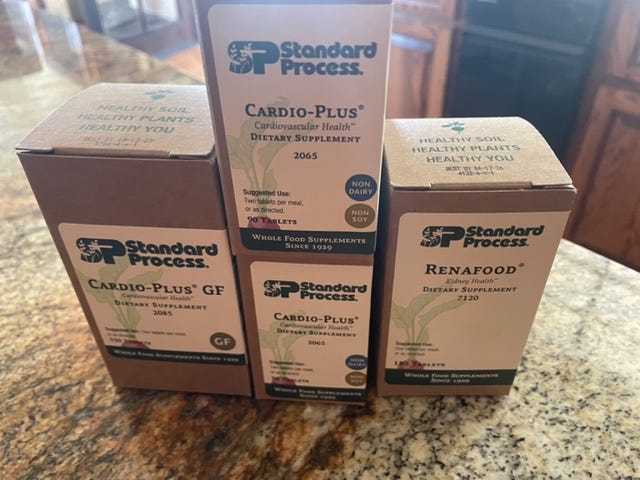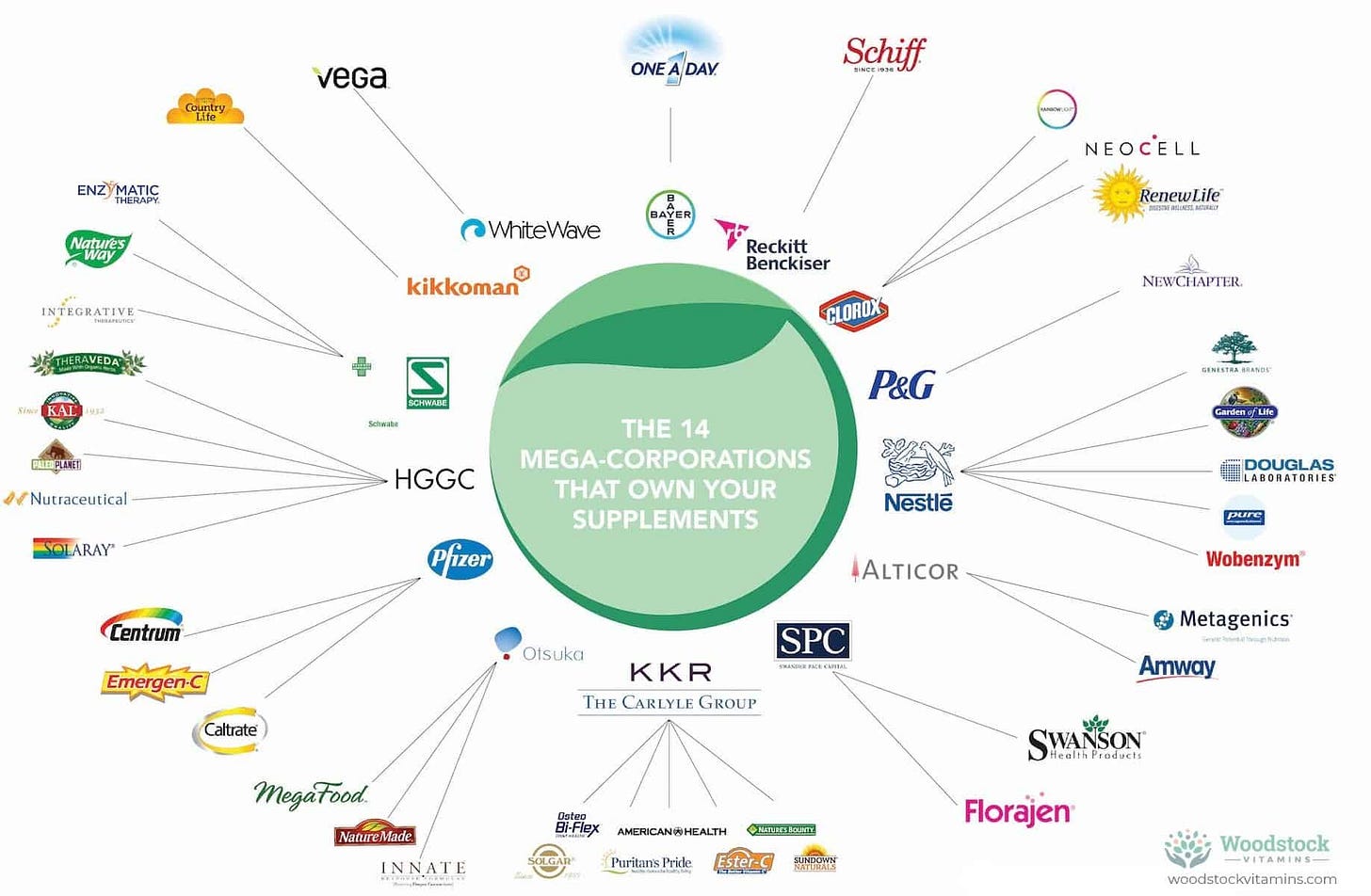What this substacker got right and what he got wrong when he discussed supplements and vitamin D. Part 1.
Do not stop taking your vitamin D nor your other supplements because of what Agent131711 wrote on substack. Read this first!
Since this post was so long, I divided it into two posts.
This first one is on synthetic supplements in response to Agent131711’s post.
The second post will respond to Agent131711’s posting on vitamin D.
If you are a paid Agent131711 subscriber, would you comment on his post (link below) with the link to this post?
Not All Supplements Are Equal
I am a free subscriber to Agent131711’s substack, and I enjoy reading them, but I also take them with a grain of salt.
So when he wrote about supplements, I was interested and went in with an open mind. Even though I am a holistic nutritionist, there is still a great deal about nutrition and health that I do not know, and I am always open to learning more.
The post was partially misguided and may encourage people to stop taking their supplements, specifically vitamin D, so I would like to clarify the misconceptions Agent131711 discussed. As a free subscriber, I could not post my comments for him to see (whoever Agent131711 is).
Synthetic Supplements Should Be Avoided
Agent131711 raises the alarm about synthetic supplements. I wholeheartedly agree that there are many junk supplement products on the market with a host of added ingredients and nutrients in forms challenging to absorb for humans that are probably a waste of money.
However, if I were a layperson reading his substack, I may think all supplements are synthetic and we should avoid all of them. (To be fair, he did share a Dr. Berg, DC video clip).
There are numerous high-quality, reputable supplements on the market, many only accessed via a qualified health professional.
And before you balk at not being able to get those reputable supplements directly, know that a nutrition professional can determine if you need that supplement, why, how much, and for how long. That TikTok influencer selling some supplements cannot do that for you!
I am a holistic, integrative, and functional nutritionist, not a Registered Dietician, so my views do not always align with RDs. I went to school for my doctorate with RDs who thought Centrum was a good supplement and that Ensure was a healthy drink for the geriatric population.
(Hint: Centrum is made by Pfizer, and Boost, the high-caloric drink geared to seniors, is made by Nestle).
Agent131711 overlooked that some people may need to take supplements, but high-quality ones, in the right forms, in the right doses, and guided by their nutrition professional.
You have your doctor guide you on your medication intake.
Your financial planner will guide you on how to invest your money
and your auto mechanic to maintain the health of your car,
so why do people not invest time or money in hiring a nutrition professional to guide them on their health, diet, and supplements?
I just don’t get it.
The full post that I will comment on is below.
Agent131711’s Experience With Supplements
“My Synthetic Vitamin and Synthetic Supplement obsession began around 2010, when I started getting into bodybuilding and was eager for advice, which I found plenty of in forums on niche sites. “
Agent 131711 states that he had a “6-foot shelf loaded to the brim with supplements.”
What is wrong with the above description of his supplement routine
He mentioned that he listened to advice from forums and niche sites. He did not consult a nutrition professional specializing in bodybuilding for an individualized approach.
He did not learn then what a quality supplement is and what is not. More than likely, the sites where he got information also sold their supplement brands.
If we looked at the ingredient label on Agent131711’s products, I could bet he consumed the same ingredient in multiple products and unabsorbable forms. In reality, he may have been taking excess doses of some ingredients, creating an imbalance in his body. Also, he probably did not need all those supplements.
While it can be a positive thing that supplements are offered directly to the consumer, supplements are a big profitable business, and many companies are willing to make cheap supplements for little money, which is probably a waste of your money.
They use marketing tactics just like processed food companies do. Healthy chips? Healthy protein bar? It is probably marketing. Read the label and bypass all the “fluff” on the front of the package.
You can find supplements in any big box store. It does not mean they contain what they say on the bottle or that the ingredients are absorbable. Just because someone such as a TikTok influencer who gets paid by brands to state certain things says, a product worked for them does not mean it will work for you.
And I have written about buying supplements from Amazon in the past. Please avoid Amazon at all costs for supplements!
How to have a healthy supplement plan
If you work with a qualified professional, they can guide you on whether you need any supplements and which ones you need. Also, nutritionists often use supplements for short-term therapeutic protocols while we are guiding the person on diet and lifestyle modifications. A qualified nutritionist should not place you on a long list of supplements, such as what Agent131711 was taking.
Do you take any medication? A nutritionist will look at drug-nutrient interactions. Something that social media influencers can’t do for you.
With my clients, I teach them how to read product labels so that they can spot a cheap, unhealthy product.
Organic Labels on Supplements
Agent131711 then shares products with an organic label but shows that not all of the ingredients are organic:
“I discovered that “Organic” means literally nothing. Even the New Yorker wrote about this great swindle. Looking closer at the Mary Ruth’s product label, it claims the other ingredients in the Synthetic Vitamin D drops are Organic. The Cholecalciferol is the same as every other Cholecalciferol Synthetic Vitamin.”
This is true, and you need to understand the rules around organic labeling. I will write a different post on organic labels to help you make healthy choices.
So, in reality, the label is correct, following the federal organic labeling guidelines. It is up to the consumer to learn the differences between 100% organic, organic and made with organic ingredients.
Yes, it is confusing and can appear to be deceptive labeling intended to trick you into buying the product, but I will clarify that for you in a separate post. Once you understand the different terms and what they mean, you won’t get swindled by deceptive marketing practices.
Who Owns Supplements
Sadly, Agent131711 is correct that many supplements are owned by big pharmaceutical or processed food companies. You can effortlessly search for who owns a brand and decide for yourself what brands you want to support.
Several years ago, I watched a program where Paul Offit, MD, was interviewed on supplements. He said they are a waste of money…except for Centrum. As mentioned already in this post, Centrum is owned by Pfizer.
Now, why would Offit only recommend that one product??
Some supplements are affordable yet cheaply made with nutrients that your body may be unable to utilize. Centrum also contains yellow, blue, and red dye. Many cheaper supplements contain the artificial sweetener sucralose.
The front of the bottle may look similar to processed food packaging with keywords and phrases such as “doctor approved,” “organic,” “whole foods,” and “all-natural” in hopes of enticing you. The label may have a picture of a farm or fruit and vegetables to look like a healthy product.
Private supplement companies do exist
There are some products in that chart that I really like, such as Wobenzym, which has been bought out by Nestle.
So, do any smaller, privately owned companies still exist?
Here are a few. Please share other supplement brands not run by large corporations in the comment section.
Euromedica is still run by the founder and president, Terry Lemerond.
Standard Process is still a family-run business with the third DuBois generation running the company.
Xymogen is family-owned.
I believe that Biotics Research is still family-owned.
Systemic Formulas is an herbal-based company whose formulas have been passed down from the founder to his son and now to his grandson.
Protocol for Life Balance is family-owned.
Bio-Tech is a veteran-owned small family business.
Bottom Line
Avoid synthetic supplements. They come with a host of added ingredients. Agent 131711 did not point out that the screenshots of supplements he shared also have sucralose. This is an indicator of a poor-quality supplement.
If the front label has many catchy phrases (I call it fluff), it is probably a synthetic supplement.
Avoiding synthetic supplements does not mean you have to avoid all supplements. Work with a health professional to get a professional-grade, non-synthetic brand.
Do not get your supplement and diet information from a social media influencer, the Medical Medium, friends, neighbors, or mainstream allopathic doctors (who have no background in supplements and diets-it is not what they are trained to do!)
If you spend money on an investment planner, car maintenance, nails, or hair, why don't you do the same with your health? Why are you getting a non-individualized plan from someone online with zero nutrition background? Ultimately, you will save money if you consult a holistic nutritionist.
A holistic nutritionist is not covered by your insurance, but neither is that nail or hair salon treatment. Skip those toxic places, and work with someone to develop a supplement and dietary regimen that meets your needs.
Most people need at least one supplement in their plan. Our soil is depleted, and the fruit and vegetables we consume today are less nutrient-rich than before WWII.
Many of us are chronically stressed, and most people do not consume a 100% whole-food diet. Therefore, we may be nutrient deficient.
I do not post on mainstream social media. Please share, comment, and like my posts and help spread the word about health misconceptions.
Paid subscribers receive supplement and consult discounts.






I had to stop reading about paragraph 14, or so, to correct something you wrote.
Nestle does NOT make Ensure. Abbott Laboratories makes Ensure. Nestle does NOT own Abbott Labs, Vanguard Group does, now there's a rabbit hole for you to go down.
ANYway, Nestle makes Boost. NOT saying Boost is any better than Ensure, other than taste. Neither, IMHO, should be drunk for your health. They are both conglomerations of chemicals and oils. However, if an aged person will not eat, the chemical version of vitamins MAY help them feel a little better in their last days.
Chocolate Boost High Protein, is so creamy and chocolately, I can't wait to have it again when I'm dying. 😋 (I worked at Nestle for years and did comparison taste testing on product before release.)
It’s just so nice for you to say to find a holistic nutritionist. But some people live in areas where none exist. And many older folk are on fixed income and can barely afford to buy groceries, let alone a nutritionist and the high priced supplements they recommend.